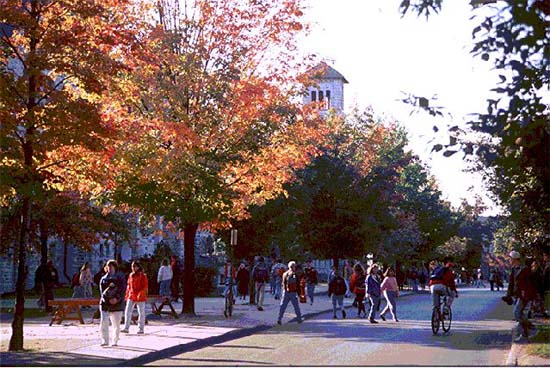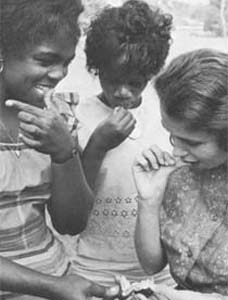
Recent graduates struggle with decision to join the Peace Corps
Working for the World: Recent graduates struggle with choosing to enter work force or join the Peace Corps
By Mary Giunca
JOURNAL REPORTER
As graduation approached, Heather Wall said she was torn by two impulses: to go into the Peace Corps or to put her interior-design degree from Salem College to work.
"We just spent all this money on an education," she said, remembering how she weighed the decision, "so I've got an offer for something I've spent four years getting a degree in."
For Wall, 26, the decision to go into the working world won out - at least for two years. In 2000, she became one of the youngest sales reps in the Hickory Chair Co.'s history.
But the Peace Corps wouldn't go away.
"There was this nagging thought at the back of my mind that I wasn't dong this thing I'd always wanted to do," she said.
Wall's story illustrates the problem many college students face in a country whose work ethic is famous throughout the world, but one in which the Sept. 11, 2001, terrorist attacks have renewed a sense of service and a desire to understand how the rest of the world lives.
The humanitarian impulse is thriving on college campuses, said Bill Currin, Wake Forest University's director of career services.
"These are students who have a global view, and they want to make a difference," Currin said.
For fiscal year 2001 (which ended Sept. 30), 5,579 people in their 20s applied to the Peace Corps. By 2002, the number of applications from people in their 20s had risen to 6,936. In 2004, that number reached 9,951. More Americans are serving in the Peace Corps now than in the past 29 years, said Jennifer Borgen with the Peace Corps.
This year Wake Forest University made the Top 25 list of small schools who send graduates into the Peace Corps. The school is ranked No. 22, with 17 alumni currently serving as volunteers.
Since the Peace Corps began in 1961, 153 Wake Forest alumni have served.
That record is the result of what Betsy Taylor, the director of the Pro Humanitate Center, calls "a culture of service."
The center was established with a $1.9 million Lilly Endowment grant in the summer of 2002. The center coordinates service trips to the Third World, sponsors retreats and acts as a clearinghouse for information on service internships, grants and fellowships.
After two years at Hickory Chair, Wall applied to the Peace Corps and was sent to Zambia.
As the daughter of a Methodist minister, Wall said that she was raised with the idea of serving others. The decision to serve isn't easy for everyone, she said.
"I feel like a lot of my friends are under pressure to achieve these items," she said. "I have friends my age who are moving into 3,500-square-foot homes, buying these cars and moving into second homes. When they see someone else achieving more, it makes them angry."
For black students, the pressures can be even greater, said Art Malloy, the associate vice chancellor for student affairs at Winston-Salem State University.
Many of the students at historically black colleges and universities, he said, are the first in their families to go to college. They are often carrying a heavy load of financial aid. They can be reluctant to delay paying off their loans, even for a good cause, he said.
Black students can also have a different service tradition, he said.
Malloy said that as an undergraduate at Ohio University, he considered entering the Peace Corps, but serving his own community won out.
"I don't have to go to Africa to see degradation," he said. "I grew up with it. Many of our students are going to have the same story."
The situation may eventually change, Malloy said. The University of North Carolina system is encouraging an international focus on all of its campuses.
As far as he knows, no one from Winston-Salem State has served with the Peace Corps, Malloy said. The Peace Corps doesn't come on campus to recruit.
The school is positioning itself to be able to compete for grants from such organizations as the Lilly Endowment, he said, but such efforts take time.
Brianna Fischer, a regional recruiter for the Peace Corps, Mid-Atlantic States region, said that the organization is dedicated to attracting more minorities. Federal student loans can be deferred during Peace Corps service, she said. Fifteen percent of Perkins loans are eligible to be forgiven each year that a student is a Peace Corps volunteer, she said. Students who complete their assigned two-and-a-half years with the organization receive a readjustment allowance of $6,000.
There are many reasons why interested students may not apply to the program, she said.
"A lot of applicants worry about security," she said. "There are some young women who are especially concerned about being alone at their sites or not having other Americans in the vicinity."
Melissa Nelson, a senior at Winston-Salem State, who is majoring in molecular biology, wants to be a doctor in the Third World. Last summer she went to West Africa to do research on malaria drugs.
She has considered the Peace Corps, she said, but professors in the international health field at other schools told her that there were safer avenues that would allow her to get similar experience.
Still, the most common reason the Peace Corps loses recruits, Fischer said, is because people don't want to leave their boyfriends or girlfriends behind.
Nelson said that deferring her life plans for two years when she's already got a long road ahead of her was an issue.
"Man, how old am I going to be when I get married and have kids?" she said.
James Wilson, a professor of history at Wake Forest University, said that he is familiar with the tug of conflicting expectations.
Both of his parents expected him to go to law school and were initially disappointed when he said he was applying to the Peace Corps.
"They didn't prepare me to go to Africa. They prepared me to become a professional," he said. He ended up being assigned to Kenya.
Wilson was the only black volunteer out of 80 people in his Peace Corps group, from 1983 to 1988.
Some students fail to understand the way that a stint in the Peace Corps can enrich their lives, he said. The Peace Corps is considered particularly valuable in such fields as international law, medicine and business, he said, but it benefits students throughout their lives, no matter what field they enter.
Peace Corps volunteers bring an inventiveness, creativity, discipline and responsibility to the work world, Wilson said.
Wall said that now that she is back home, she sometimes worries that her Peace Corps experience causes employers to look at her differently from other recent graduates.
"I feel that my Peace Corps experience hurts me professionally," she said. "When companies look at my resume, it throws them off. They don't know what my direction is. They fear that I might go off somewhere else."
Yet, she doesn't regret the experience.
"I have these things that I feel passionate about," she said, "but when I look at my time in the Peace Corps, even when I struggled there was always a purpose there."
• Mary Giunca can be reached at 727-4089 or at mgiunca@wsjournal.com









